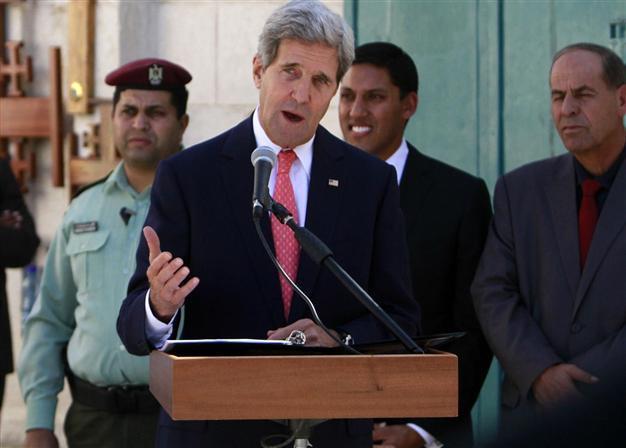Kerry meets Israeli, Palestinian leaders over troubled peace process
BETHLEHEM, West Bank - Reuters

US Secretary of State John Kerry gives a speech during a visit on November 6, 2013 in the West Bank city of Bethlehem. AFP PHOTO
U.S. Secretary of State John Kerry, faced with grim Israeli and Palestinian assessments of progress in peace talks, said Nov. 6 that Washington was not giving up on a deal."As in any negotiation there will be moments of up and moments of down, and it goes back and forth," Kerry said in Bethlehem, in the occupied West Bank, where he met Palestinian President Mahmoud Abbas.
"But I can tell you that President Obama and I are determined, and neither of us will stop in our efforts to pursue the possibility (of peace)," he said.
Earlier at a meeting with Kerry in nearby Jerusalem, Israeli Prime Minister Benjamin Netanyahu said the negotiations on a two-state solution to the Israeli-Palestinian conflict had failed to make any real progress.
The bleak picture painted by the right-wing leader was similar to the one sketched by senior Palestinians, who have said an Israeli plan announced last week for 3,500 more settler homes in the occupied West Bank was a major obstacle to the success of the negotiations.
But in Bethlehem, Kerry said the United States, Israel's closest ally, was convinced "that despite the difficulties, both leaders, President Abbas and Prime Minister Netanyahu, are also determined to work towards this goal".
Kerry, whose shuttle diplomacy helped to revive the land-for-peace talks last July after a three-year break, has set a nine-month target window for an agreement, despite widespread scepticism among Israelis and Palestinians.
Few details have emerged from the negotiations, held at unannounced times and at secret locations in line with pledges to keep a lid on leaks.
But Palestinian officials have been airing their frustration over a lack of movement on core issues such as the borders of a Palestinian state, security arrangements, the future of Israeli settlements and the fate of Palestinian refugees.
Abbas, in a speech broadcast on Monday, said that after all the rounds of negotiations "there is nothing on the ground".
Friction
Public friction between the two sides has been focused on the Israeli drive to erect more homes for settlers in tandem with the release of Palestinian prisoners.
Israel has already freed half of the 104 jailed Palestinians whom it pledged to release after Kerry persuaded Abbas to return to negotiations that Palestinians abandoned in 2010 over settlement building they fear could deny them a viable state.
Palestinians have bridled at Israel's assertion that they effectively agreed to turn a blind eye to the settlement campaign, on land they seek for a state, in exchange for the men, long-serving inmates convicted of killing Israelis.
Speaking in Jerusalem to reporters, with a stone-faced Kerry at his side, Netanyahu accused the Palestinians of creating "artificial crises" and trying to "run away from the historic decisions that are needed to make a genuine peace".
Netanyahu said he hoped Kerry's discussions in Jerusalem and with Abbas "will help steer (the negotiations) back to a place where we could achieve the historical peace that we seek."
Israeli settlements in the West Bank and East Jerusalem, territories it captured in the 1967 Middle East war and which Palestinians seek, along with the Hamas Islamist-run Gaza Strip for a state, are considered illegal by most countries.
Israel cites historical and biblical links to the West Bank and East Jerusalem, where about 500,000 Israelis now live alongside 2.5 million Palestinians.
In another development, Netanyahu said former Israeli Foreign Minister Avigdor Lieberman will return to the cabinet after his acquittal in a corruption trial on Wednesday.
The right-wing powerbroker is a hardliner on the peace talks with the Palestinians, which he has said have no chance of succeeding.
In the Gaza Strip, Hamas spokesman Sami Abu Zuhri said any deal reached by Abbas, a rival of the Islamist group, "would not be binding on our people".
















